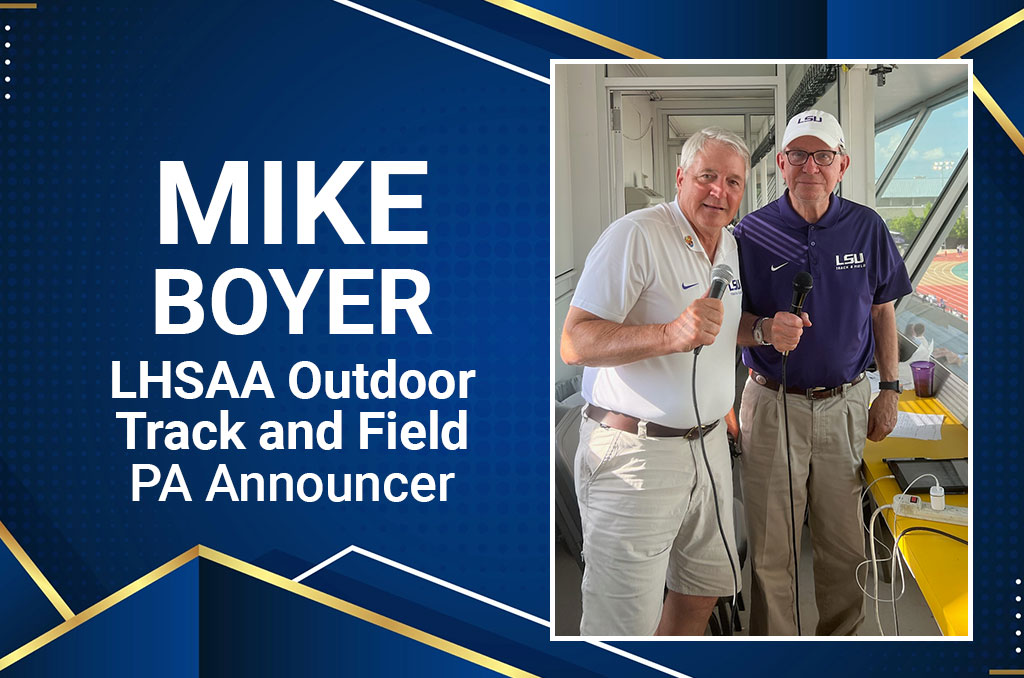
Easy on the ears: PA announcer Mike Boyer’s an institution heading into his 50th LHSAA Outdoor Track and Field meet this year
by William Weathers // GeauxPreps.com Contributor
It was the culmination of one of the greatest track and field careers in Louisiana high school history.
Gabrielle Jennings of Slidell’s First Baptist Christian High School was in her customary position on the track – far ahead of the competition in 2016 – when the senior was 600 meters away in the 3200-meter run from winning the 44th individual state championship in her illustrious career.
Jennings had been a mainstay in the winner’s circle in eight years of cross country, along with indoor and outdoor track.
In order to provide the perfect backdrop on Jennings’ record setting career, public address announcer Mike Boyer waited until the 600-meter mark to have enough to rattle off her reign of superiority that began in the fifth grade.
“I tried to time it,” said Boyer, who was commended by USA Today for his gesture. “As she crossed the finish line I said, ladies and gentlemen this is Gabrielle Jennings’ 44th individual state championship. She has let it be known, that on her last lap, she could barely make it because she was in tears.”
For 49 years of the Louisiana High School’s Outdoor Track & Field Championships, Boyer’s been a constant with a level of professionalism, knowledge of the sport and extreme preparation that’s made the sound of his voice reverberating throughout LSU’s Bernie Moore Stadium a memorable experience for track fans.
“I’ve been going to meets throughout the area and the state meets for probably 50 years,” Lafayette native Tony Beaugh, a former sports editor of the Eunice News. “For me, he’s the voice of track and field in Louisiana.”
Boyer, 70, will mark his 50th opportunity to call an LHSAA Outdoor Track & Field Championship, along with cohort Lynn Roberts in his 44th meet, when the three-day meet begins Thursday with the running of the Class 1A-B-C schools. The 2A-3A schools follow on Friday and the 4A-5A schools on Saturday.
That’s 14 track meets squeezed into three action-packed days, creating a lifetime’s worth of memories Boyer’s managed to capture from his view atop Bernie Moore Stadium.
“I’ve been blessed by principals that gave me release time when I was a coach,” said Boyer, the principal at Teurlings Catholic in Lafayette. “I’ve been blessed by my assistants who covered for me when I had been a principal. That’s allowed me to do this three times (LHSAA’s state cross country, indoor and outdoor meets) a year.
“I’ve tried to give a product that’s enjoyable, it is impactful and it’s constant,” Boyer said. “That’s why I think I’ve been able to survive several regimes at not only LSU, but the LHSAA.”
Boyer’s a member of LSU’s Track Officials Association – a legion of veterans of the sport that help put on the meet. His first such LHSAA outdoor meet was in 1974, while he’s also served as the public address announcer for every LHSAA state indoor meet since ’82.
“Everybody knows him by his voice if they don’t know him by name,” Beaugh said of Boyer. “He’s “Mr. Track and Field” as far as the announcing’s concerned. He’s just tremendous.”
Running career leads to love affair with track and field
Boyer, a native of Baton Rouge, was a former long-distance runner at Broadmoor High School where he captured a state championship before attending LSU dreaming of reaching greater heights.
Boyer blew out his knee while in college and never ran competitively again.
There were two indelible moments that helped shape his announcing career – the first time occurring the time Boyer heard his name called while running at a regional Junior Olympics meet.
“When I ran track, I never remember hearing my name,” he said. “But I heard it when I was sophomore in Texas, and I asked my dad, ‘how did they know it was me’? I had no clue about that, and it impressed me. That was a big deal that I heard my name in the middle of a race.”
Boyer, while still in high school, would assist with LSU track meets where heard the booming voice of public address announcer Sid Crocker.
Boyer was on the headsets, passing along developments on races to Crocker and even taking the time to help pronounce tricky African surnames.
“Sid Crocker had this unbelievable voice that I do not have,” Boyer said. “But he didn’t have any track knowledge and I do. Every once in a while, I’d go up (to the press box) and do a little bit when (LSU track coaches) Bill McClure and Sam Seames came in. I started doing all of the LSU meets.”
While Boyer began to develop a career in coaching, working at E.D. White in Thibodaux, Catholic High of Pointe Coupee in New Roads and St. Thomas More in Lafayette, he had also carved out a niche as a track announcer.
He began working on his trade several years before in his hometown, helping announce junior varsity and middle school meets, until news spread of just how entertaining and good he was.
Boyer moved up to high school meets throughout the city such as Broadmoor’s Bat Gourrier Relays and the Lee High Rebel Relays.
“I loved the sport,” he said. “I tried to figure out what else I could do. I was thinking this was really good. I get to meet these people when I go looking for a job.”
Boyer was a successful coach, especially in cross country and track, where his teams won several district, parish and regional championships. His boys’ cross country team at STM was the 1991 state runner-up.
“I think my strength is I have passion for it,” said Boyer, a member of the LSU Track & Field Officials Hall of Fame and recipient of the Louisiana High School Track Coaches’ Lifetime Achievement Award. “I remember being there myself and I want to share that experience with kids of today and kids of tomorrow.”
Recognized on a national level
While Boyer was well-known in state circles, announcing LSU’s meets since ’77 and Louisiana-Lafayette’s meets since ’86, he found himself in demand to call even bigger events.
His introduction to the LHSAA’s state meet, though, was more of a case of happenstance when the intramural director at LSU, who handled the announcing at the state meet, didn’t show up one year and a replacement was needed.
“It’s kind of been my gig ever since,” Boyer said.
Boyer went onto become the announcer of the 1992 Olympic Track & Field Trials in New Orleans, along with handling 15 SEC Indoor and 2 SEC Outdoor Championships, four NCAA Outdoor Championships and one NCAA Indoor Championship meet.
Boyer, who also called conference championship meets for the Southwest Athletic Conference, Metro Conference, Southland and Sun Belt Conferences, has also been in the booth to work such events as the International Senior Olympics, International Special Olympics and National Junior Olympics.
“You see other people and steal ideas of how to do some things,” he said. “It’s a maturation process as such is life. If you’re not growing and learning you’re not getting any better.”
Information adds to fan’s experience, athlete’s enjoyment
Beaugh points to Boyer’s ability to literally spit out volumes of information in a split second, albeit pre-or-post-race. Whether it’s previous state meet finishes, whether a time or mark that may a participant nationally, simply adds to the enjoyment for fans of a races called by Boyer.
“He spouts off the information right after the official time was displayed,” Beaugh said. “He’s extremely knowledgeable and obviously loves the sport.”
As part of his job description Boyer, both at the state cross country meet and LHSAA indoor and outdoor events, tries to provide information on every competitor.
It’s a thorough task that began with the annual accounts of the state meets chronicled by the Baton Rouge State-Times and continued throughout the years by impeccable record keeping until Boyer’s wife cleaned out the closest with his keepsakes.
“Now we’re in a digital age,” Boyer said, “and you don’t need to keep all of that.”
Boyer introduces competitors in all field events and with help from Roberts, provides top marks and updates throughout. Once action moves to the track, he will introduce the athletes along with their lane assignments, their school, previous achievements and the final places and times afterward.
His play-by-play of the running events, particularly the sprints and relays, builds a synergy within the facility and brings fans to their feet in anticipation of a dramatic finish.
“I hear a lot of guys and it’s like their cadence is more important than the race,” Boyer said. “It’s not about me. The race will speak for itself, and it will give me a style to do it. Obviously, in high school, a two miler’s a different style than that of the 100 meters.”
Before the awe-inspiring career of Jennings, Boyer recalled several other unforgettable efforts over the course of his 49-year career at the LHSAA outdoor meet.
During the 1978 state championships, Boyer watched the quartet led by Orlando McDaniel and Efrem Davis of Lake Charles High not only win the state championship, but set a then national record with a time of 1 minute, 24.9 seconds in the 4×220 relay.
He also intently watched and articulated the 1998 horizontal jump duels in both the long and triple jumps between future LSU standout and Olympian Walter Davis of Beau Chene and future Florida State and NFL wide receiver Javon Walker of St. Thomas More.
“That’s my personal favorite,” Boyer said. “One jump Javon set a record and then Walter jumped and broke the record. In the triple jump, they were 1-2 in the country at that point.”
More than a decade later track fans were treated to future LSU All-American and Olympic Mondo Duplantis in the pole vault where the seven-time state champion left a lasting impression and a Bernie Moore Stadium record effort of 19 feet, 5 ½ inches which still stands.
“The enjoyable thing for a family is to listen to their child’s name being called and it’s even more special when it’s a podium name,” Boyer said. “I’m glad I’m a part of it. I’m glad I’m still able to do it. I still think I’ve got a lot more opportunities to do it.”
